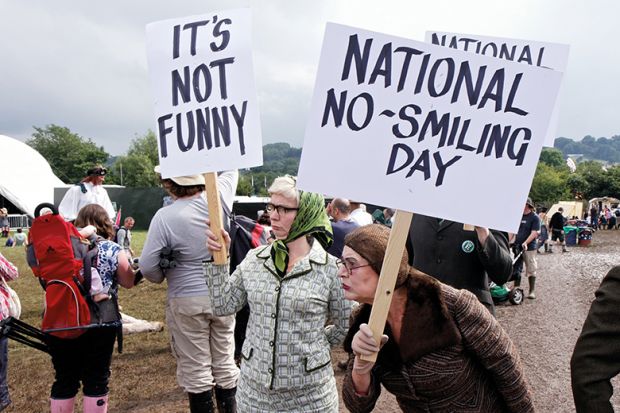More academic misery – shock report
“They shouldn’t believe everything they read in Times Higher Education.”
That was the forthright response of Louise Bimpson, our Corporate Director of Human Resources, to Poppleton academics who were, in her words, “mischievously” citing the results of a newly published THE survey of work-life balance as evidence of the growing divide between academics and professional university staff.
Ms Bimpson agreed with our reporter Keith Ponting (30) that the survey did appear to show that, on the whole, managerial staff were happier than academics, worked fewer hours, were more able to switch off, and were less likely to claim that their work affected their mental health.
“But”, said Ms Bimpson, “the survey completely overlooks the critical importance of personality factors. One hardly needs a major survey in order to establish that managers and professional staff are by their very nature optimistic and forward-looking whereas academics are routinely marked out from the rest of the population by virtue of their endemic miserabilism. Linguists are surely not alone in selecting ‘cheery professor’ and ‘jolly senior lecturer’ as paradigmatic oxymorons.”
But, suggested Ponting, didn’t Ms Bimpson detect some grounds for concern in the survey’s further findings that, compared with professional staff, academics had less time for their friends, enjoyed fewer holidays and were more likely to be considering switching careers?
Ms Bimpson remained unsympathetic. “I think you’ll find that academics devote considerably more time to undermining old enemies than cultivating new friends, are singularly incapable of discovering a satisfactory holiday destination, and are rarely qualified for any job other than the one they currently hold.”
(At this point in the interview, Ms Bimpson excused herself on the grounds that unlike “some academics she could name”, she “still had a home to go to”.)

Name that don
What can be done to ensure that undergraduate students attend compulsory courses?
According to our Deputy Head of Student Experience, Nancy Harbinger, a number of methods have been tried at Poppleton. These have included taking a headcount, calling a register and the selective use of an electric cattle prod.
But Ms Harbinger announced last week that our university will be adopting a method pioneered by the Sichuan Vocational College of Cultural Industry, a university in south-east China, that became concerned about the number of undergraduates skipping a compulsory course in law and ethics.
All students who were supposed to have attended these lectures were shown portraits of different teachers and asked to select the one who had taught the course.
Ms Harbinger confirmed that the method would be used at Poppleton to assess the attendance of first-year students at the compulsory Introduction to Media Studies lectures offered by our Department of Media and Cultural Studies.
In line with the Chinese model, these students would be shown the set of portraits above and asked to identify the lecturer who had taught the course.
